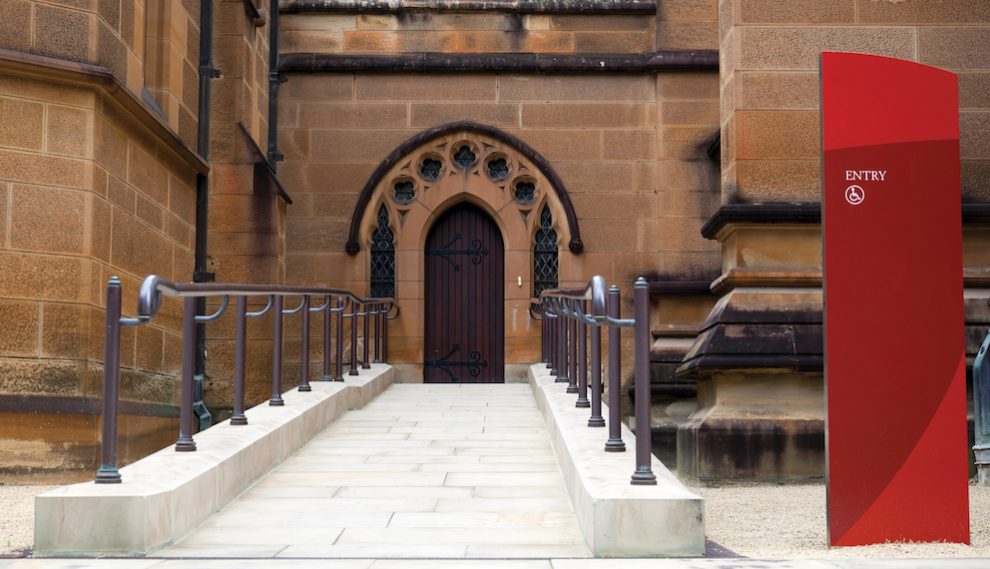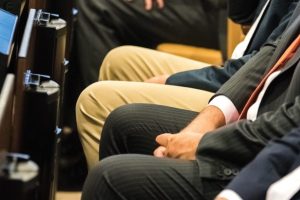In the spring of 2006, I made a decision to try a new Catholic church. As the mother of an 8-year-old with severe autism, I had already experienced my fair share of hurt and disappointment while attempting to include my daughter in community activities. My efforts to try to include her with her typical peers at the Catholic church where she was baptized had failed. As I walked into an appointment with the religious education director at a new church, I braced for another disappointment.
Fortunately, this experience was quite different. “We will figure out a way,” the religious education director told me. These words were all it took to make me feel that our family, severely affected by disability, would be welcome in this parish.
This meeting also marked the beginning of my quest to make our new church and, subsequently, other Catholic and Protestant churches in our area inclusive, welcoming, and accessible to those affected by any kind of disability. Although new to the field of faith and disabilities, I sensed that there were many more people out there facing the challenge of including families affected by disability.
I soon learned that the Catholic Church is very clear on the importance of including all people.
In 1978, the Pastoral Statement of U.S. Catholic Bishops on Persons with Disabilities opens with the words: “The same Jesus who heard the cry for recognition from the disabled of Judea and Samaria two thousand years ago calls us, his followers, to embrace our responsibility to our own disabled brothers and sisters in the United States.” Forty years later, the National Catholic Partnership on Disability celebrated the anniversary of the pastoral statement by proclaiming that “no parish community is healthy and flourishing if it does not welcome persons with disabilities.”
The inclusion of persons affected by disability should be a priority of all Catholic parishes. Yet more than 40 years after that landmark pastoral statement, there are people who feel excluded because of physical barriers or barriers of communication and attitude.
As director of the Faith Inclusion Network, I routinely field calls and emails from parents who have been asked to leave their church because of a child’s behavior, a behavior that the child cannot control because of their disability. Since the family will most likely not attend without their child, the parish has not just lost an individual Catholic but an entire family.
Additionally, there are still Catholic churches that are inaccessible for people who use wheelchairs. They may have a ramp into the building but do not have accessible bathroom facilities or elevators to the second floor.
Fortunately, there are also parishes around the country that are making strides to be accessible, inclusive, and welcoming. These churches have intentionally considered the needs of individuals and families affected by disability and strive to offer ways to include them.
If your parish is considering how to include persons affected by disability, here are five best practices to consider.
1. Know the needs of your parish.
There are many ways to ensure a parish is accessible. From ramps and elevators to American Sign Language interpretation, child care, and support during worship and religious education, one church may not be able to provide everything. The most successful inclusion efforts take a congregation’s members into account. This can be done through congregational assessment surveys or informal conversations with members of the parish. Once you know the community’s accessibility needs, a plan can be put in place to begin meeting some of these needs. Gradually, the parish can add more accommodations over time.
2. Presume competence.
It is extremely disrespectful to talk down to a person affected by disability or, even worse, to ignore them and only speak to their attendant or parent. Whether a person is affected by cerebral palsy, autism, Down syndrome, or another disability, it is important to speak directly to that person and assume they understand and would like to communicate. Their means of communication may be different than that of the typical person, but it is likely that they understand some or all of what is being said.
Perhaps the most effective way to presume competence is to offer opportunities for people affected by disability to participate in various volunteer capacities. Does your parish intentionally ask persons affected by disability to usher, read scripture, or sing in the choir? Don’t wait for the individual to offer their services (they may have had negative past experiences, even if they are attending your church regularly) but rather just ask them. Even if they don’t accept, the fact that you asked presumes competence.
3. Don’t keep your efforts to be accessible and inclusive a secret.
I regularly receive requests from people with disabilities and their family members for recommendations of local inclusive and welcoming churches. Families affected by disability do not usually have the luxury of shopping around to find a parish that meets their needs. Churches that offer accommodations need to put their information on their website. A visitor should be able to observe signs that the parish is intentionally including people with disabilities.
My own church lists my name in the bulletin as our parish advocate. This sends a clear message: We are aware that some people may need help to participate in our parish, and we want them to reach out.
4. It’s all about relationships.
One of the most common requests I get is to consult on the inclusion of a child with a severe developmental disability, especially in regard to behavior. Yes, of course we want our children who have disabilities to learn the faith, just as we offer that opportunity to typical developing children. Churches that do this best understand that the first step is developing a relationship with the entire family.
Developing a relationship starts with open communication. Churches that effectively include children with a disability start by having a conversation, ideally at a time outside of the hectic Sunday worship/religious education, to learn more about the child, the family, and what works best for everyone. How does the child learn best? What are they good at? Once some basic trust begins to develop, everyone will feel more comfortable addressing any challenges that may come along.
5. Conduct outreach to develop a culture of inclusion.
There is a rather large parish near me that offers a social ministry to people of all ages affected by disability. They meet one evening a week at the church and enjoy dinner, activities, and a gospel message from a guest speaker. The regular attendance is around 75 people. For special occasions, such as their annual Christmas party, they will have 200 people or more.
Do all these people attend their weekend Masses? No, of course not. But by providing this outreach, the parish has attracted adults with disabilities who would not otherwise come to church. By including (and in some cases baptizing and confirming) this community, the church has developed a culture of inclusion and understanding and can pride itself on offering an outreach that gives people with disabilities a safe and loving place to socialize.
There are other kinds of outreach that can achieve the same outcome. For example, a large parish in a nearby town offers a regular respite night. Caregivers can drop off their children with disabilities and their siblings and go out for a much-needed night out on their own.
Back when I first began attending my church, I started a support group for parents raising children with special needs. It drew in parents of many different churches as well as Catholic families. Several of these families ended up moving to our parish; they felt that if our church had a support group like this one, then certainly they might be able to include their child with a disability in other aspects of parish life.
Inclusive, accessible, and welcoming Catholic parishes can be found throughout the United States, but the work is far from done. People affected by disability should not need to search for a place to worship. They should not have to worry whether they will be able to access the building, participate in social or educational programs, or be accepted at all. All Catholics, regardless of ability or disability, should be able to enter a Catholic church and know that they belong. It is simply a matter of our Christian faith. Let’s get to work.

This article also appears in the August issue of U.S. Catholic (Vol. 85, No. 8, pages 32-35). Click here to subscribe to the magazine.
Image: iStock














Add comment